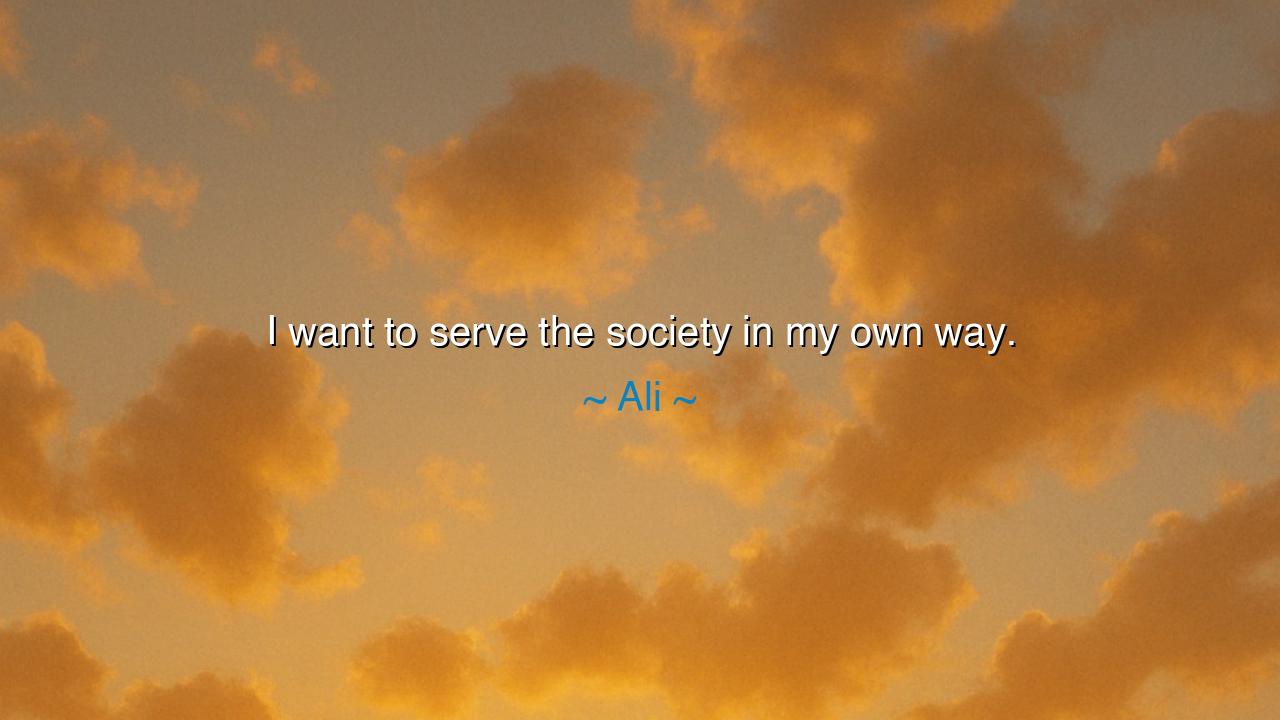
I want to serve the society in my own way.






Ali, the name borne by saints, poets, warriors, and sages, once uttered words as simple as breath, yet as enduring as stone: “I want to serve the society in my own way.” This utterance is not a boast, nor is it a plea—it is a declaration of purpose, a vow to walk the path of contribution not in imitation of others, but in the authenticity of one’s own being. For the ancients knew, and Ali reminds us, that service is not measured by grandeur or conformity, but by sincerity.
The meaning shines forth with clarity: to serve is the highest calling of man, but every soul must answer this call through the gifts given uniquely to them. One may heal with medicine, another with words; one may lead armies, another may raise children in wisdom; one may build with stone, another may inspire with song. To say “in my own way” is to recognize that the divine spark in each person burns differently, and it is in that difference that the strength of society is found.
History gives us luminous examples of this truth. Consider Mahatma Gandhi, who chose not the path of violence or kingship, but of quiet resistance—his own way of serving. With spinning wheel and salt march, he defied an empire, not by imitating the warriors of old, but by embodying his conviction of nonviolence. Many mocked him at first, yet his “own way” became the key that unlocked India’s freedom. Thus, Ali’s words remind us that the greatest service often comes not from following the road already paved, but from carving a new one.
Think also of Florence Nightingale, the Lady with the Lamp. In an age when women were denied the honor of public service, she answered the call through care and compassion, tending the wounded in the Crimean War. She did not march, she did not legislate, yet her footsteps through darkened hospital halls reshaped medicine and gave birth to modern nursing. She too said, in her deeds if not her words: “I will serve in my own way.” And the world was changed.
Ali’s teaching is also a shield against pride. Too often men and women compare their service to others, thinking it too small, too hidden, too humble. But the farmer who feeds the people, the teacher who shapes young minds, the neighbor who lifts a fallen soul—all are serving, and their service is no less than that of kings. For society is not nourished by a single fountain, but by many streams flowing together. Each stream matters. Each “own way” is sacred.
The lesson for us is both liberating and demanding. It tells us: you need not serve as another serves, but you must serve. Do not shirk the call because your way seems small, nor abandon it because the world does not applaud. To serve society in your own way is to add your thread to the tapestry of life, and without your thread, the picture is incomplete. The divine did not fashion you to be a shadow of another, but a light in your own form.
Practical action, then, is simple: discover your gift and use it for others. If you are strong, lift burdens. If you are wise, share counsel. If you are creative, bring beauty. If you are kind, spread compassion. Do not wait for permission, nor for the crowd’s approval—begin with what you have, where you are. This is how Ali’s words take flesh, and how society is enriched not by one mighty hero, but by countless souls serving each in their own way.
So let this teaching echo across the ages: “I want to serve the society in my own way.” Carry it in your heart as a compass. Live it with courage and humility. And when your days are done, let it be said of you, as of Ali, that you did not waste your life chasing another’s path, but walked your own, leaving behind the gift of service that no one else could give.






AAdministratorAdministrator
Welcome, honored guests. Please leave a comment, we will respond soon